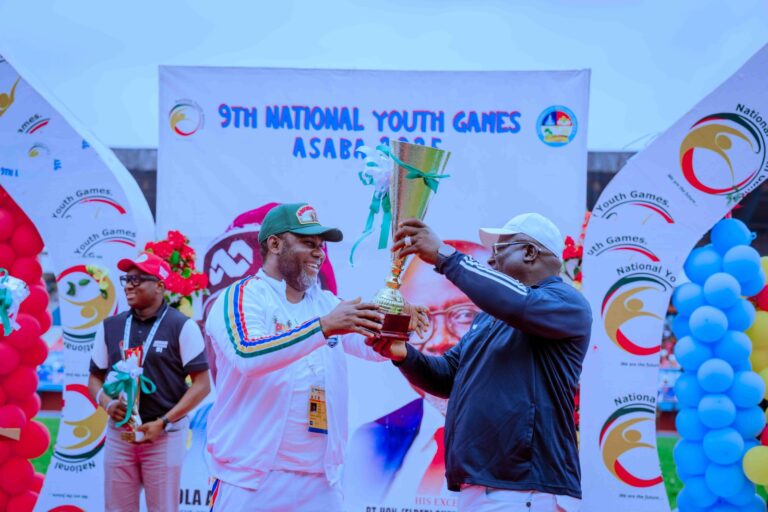/ Sports
Views: 395
Age cheating threatens credibility of National Youth Games, Oborevwori warns

The 9th edition of the National Youth Games (NYG) in Asaba ended with fanfare on Saturday, but a troubling issue overshadowed the celebrations with a persistence of age cheating among participating states.
Governor Sheriff Oborevwori, speaking at the Stephen Keshi Stadium during the closing ceremony, warned that the practice was undermining the integrity of the games. He said what began days ago with excitement and ended in a “glorious conclusion” must not be allowed to lose its credibility.
The governor described the event as a “festival of unity, discipline and excellence,” but lamented that states fielding over aged athletes were eroding the vision of the competition. He urged the National Sports Commission (NSC) to urgently introduce stricter measures to ensure the games remained a genuine nursery of young talents.
Oborevwori commended the athletes for their resilience, noting that whether or not they won medals, they had inspired the nation through their courage and determination. He also praised Team Delta for sustaining its tradition of sporting excellence while emphasizing that the games had provided a platform to discover fresh talents across the country.
Despite these positives, the governor’s concerns echoed a recurring criticism of the games. Stakeholders have long argued that the credibility of the NYG is being weakened by the failure to curb age falsification, which deprives genuine young athletes of opportunities to develop.
Chairman of the NSC, Mallam Shehu Dikko, represented by Chief Amaka Asiofu, sought to highlight the achievements of the Asaba edition. He described it as “an incredible experience, marked by fair competition, determination, exciting adventures, and inspirational sportsmanship.”
Dikko praised Delta State’s robust sports development system and assured that the commission would continue implementing policies to nurture talents while also promoting a sports economic ecosystem that could contribute to Nigeria’s gross domestic product.
Similarly, the Chairman of the Delta State Sports Commission, Mr. Onoriode Oborevwori, said the Games had showcased not only the competitive spirit of Nigerian athletes but also values of friendship, resilience and cooperation. He thanked the NSC, organizers and stakeholders for their commitment and called for continued collaboration to drive sports development.
The medal table told its own story of shifting dominance. Lagos State emerged overall winners for the first time, with 110 medals including 52 gold. Delta State, the host, finished second with 114 medals, including 37 gold, while Edo State placed third with 79 medals.
In total, 33 states won medals, with a combined haul of 802. The figures reflected the breadth of participation but also raised fresh questions about whether the games are truly living up to their mission of talent discovery and fairness.
While Oborevwori expressed appreciation to President Bola Tinubu, the NSC, the local organizing committee, coaches, officials and volunteers for their roles in making the games successful, he warned that without urgent reforms, the NYG’s credibility could be permanently damaged.
He assured that Delta State is ready to host the 10th edition in 2026, as agreed in the four year hosting rights deal. The governor concluded by congratulating participants and wishing them safe travels, but his warning about age cheating now hangs over the NSC as a test of whether the games can truly remain a breeding ground for the nation’s next generation of athletes.